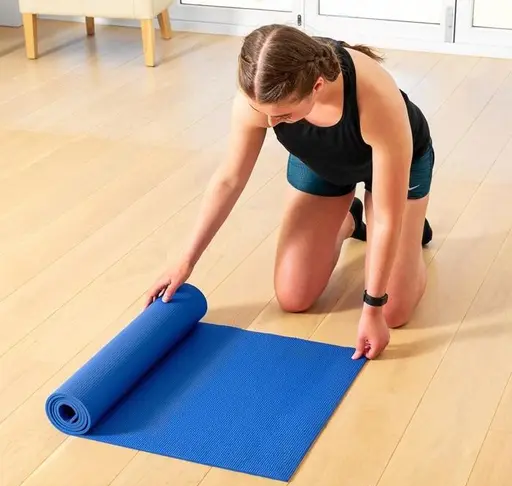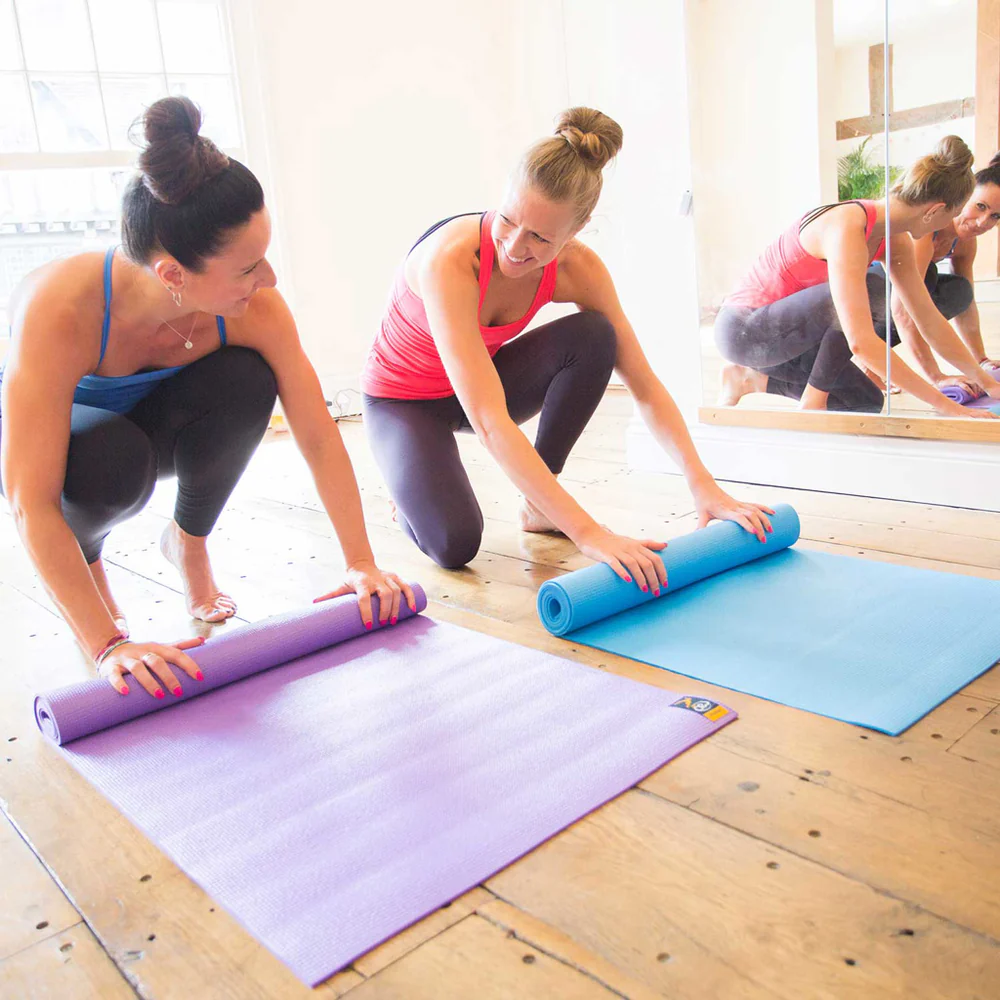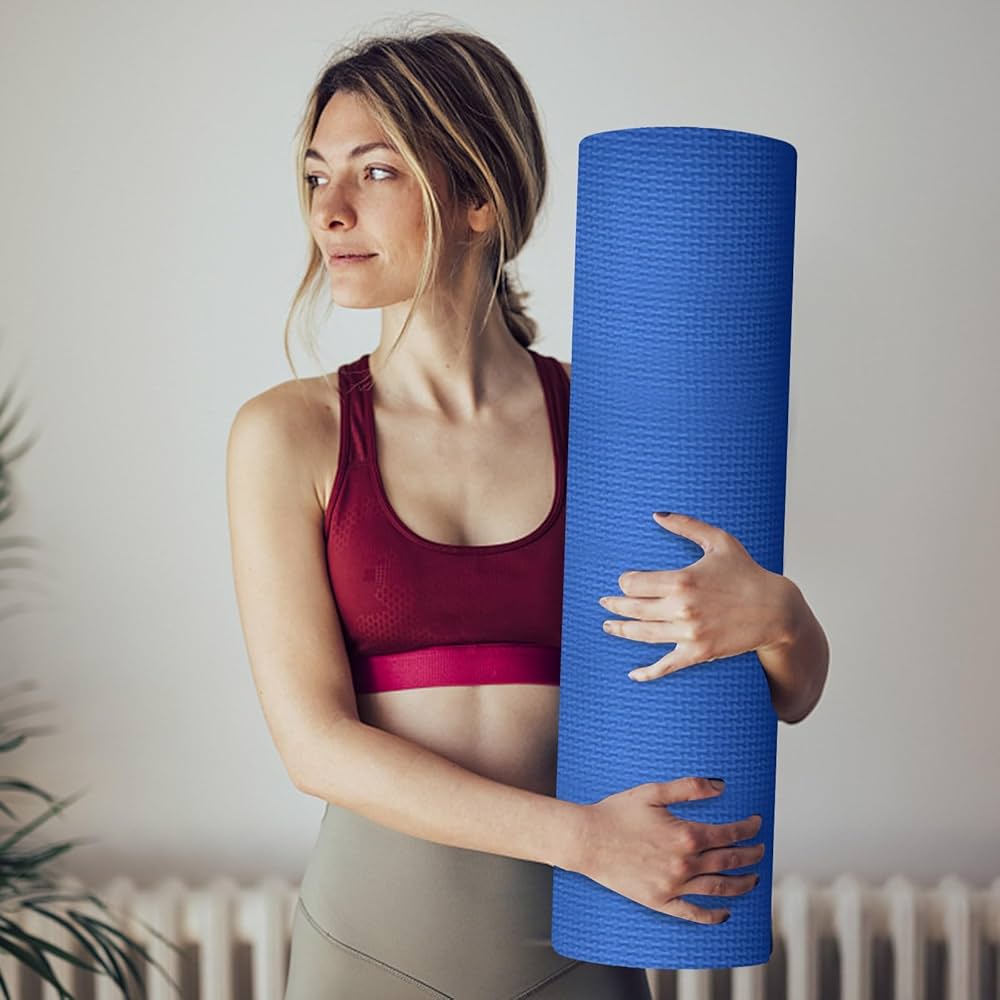Yoga, as we all know, is the way to live a healthy, happier, and disciplined life. For a good yoga session, a person requires a good and comfortable yoga mat. Choosing the perfect yoga mat helps in making the yoga journey comfortable. There are many yoga mats available in the market, having various materials, textures, thicknesses, and sizes.
As a beginner, selecting a good yoga mat according to your needs is the key to a special feeling. Yoga on a perfect fitted mat not only helps in physical practices, but also supports your mental health along with providing safety, motivation, and comfort. As a newbie to yoga, you should choose the Yoga Material mat that can give you utmost comfort, make you feel safe, inspire you to practice more, and give proper support.
Most common yoga mats are made up of TPE and PVC, which helps beginners to get started with ease and comfort. This provides a longer commitment to the yoga practices. Choose your yoga mat according to your comfort, practice style, budget, and values. This article helps you to know about the best-suited yoga mat for a beginner.
Why Does the Material of a Yoga Mat Matter?
Each of the materials used to make a yoga mat has advantages of its own. When selecting the ideal yoga mat for yourself, beginners should take into account features like stability, comfort, support, and ease of use. There are several ways that the mat material might impact your practice. The correct mat becomes crucial for sustaining alignment, comfort, and focus throughout lengthy sessions during courses like Yoga Teacher Training in Kerala.
mentioned
1. Comfort and cushioning
3. Durability
5. Grip and traction
2. Weight and portability
4. Maintenance and hygiene
6. Eco-friendliness
Common Yoga Mat Materials (Pros & Cons)
1. Polyvinyl Chloride or PVC
This synthetic plastic polymer is the most common yoga mat material used by beginner-
level yoga students. This yoga mat is considered the best for beginners as it provides good
support and grip under the budget-friendly range. However, due to the use of materials
that harm the environment, it is not a good choice for environmental lovers.
Benefits
Good longevity and durability
Non-slip surface with strong grip
Easy to clean
Comes in a budget-friendly range
Easily available
Demerits
Non-biodegradable
Chemicals used are not safe for the skin.
Can be heavy
Thermoplastic Elastomer or TPE
This is the eco-friendly yoga mat material. It is made up of rubber and plastic. This is an
excellent choice for beginner yoga students as it renders softness and lightness. Moreover,
it is a perfect choice for its eco-friendliness and better performance.
Benefits
Portable and Lightweight
Less environmentally harmful than PVC
Can be recycled
Soft and cushioning yoga mat
Water resistance
Good grip
Demerits
Low durability compared to PVC
It loses its grip over time.
More expensive than PVC
Natural Rubber
This eco-friendly vyoga mat is made from the natural rubber extracted directly from
rubber trees. For a regular practice person, this serves as the best choice due to its non-
toxicity and sturdy nature. However, the price of this nat is slightly higher.


Benefits
Biodegradable and Natural
Outstanding grip
Strong cushioning with better joint support
Durable and long-lasting
Demerits
Heavier compared to TPE and PVC mats.
Natural smell of rubber
People with latex allergy should avoid
More expensive
Cork
Cork yoga mats come with the surface of natural cork along with the backing of TPE or
rubber. For yogis going for hot yoga or having issues with regular sweating, they can use
this mat. However, it may feel a little firm for beginner-level yoga students doing gentle and
slow practices.
Benefits
Naturally antimicrobial
Excellent grip
Sustainable and Eco-friendly
Aesthetically pleasing
Demerits
Can be slippery
Under heavy use, it may wear out faster.
Comes with limited cushioning
Not very soft
Expensive one
Cotton or Jute Mats
They are eco-conscious and conventional yoga mats made up of jute fibers and woven
cotton. These mats are good for a meditative and gentle style of yoga. Cotton or Jute Mats
are good for seated yoga practices.


Benefits
Absorbent and Breathable
Used in traditional yoga ashrams
100% natural and biodegradable
Demerits
Minimal cushioning
Not having fine gripping.
Slippers on plain surfaces
Requires frequent washing
Key Considerations for Beginners
As a beginner, while selecting a mat, consider the following features:
1. Mats with better cushioning or 5–6 mm thickness are helpful for added support.
3. When practicing yoga, a mat with non-slip surfaces aids in keeping balance.
4. A sturdy and supportive yoga mat is essential for maintaining safety, comfort, and stamina throughout extended practice sessions, such as the 200 Hour Yoga Teacher Training in Kerala.
practices
If you practise multiple forms of yoga, such as Hatha vs. Vinyasa, make sure your mat is lightweight. In what ways might mobility and the ease of transporting your mat improve your entire experience?
2. Skin-friendly and non-toxic yoga mats are best for beginners
3. Mats that are easy to clean are best for beginners


